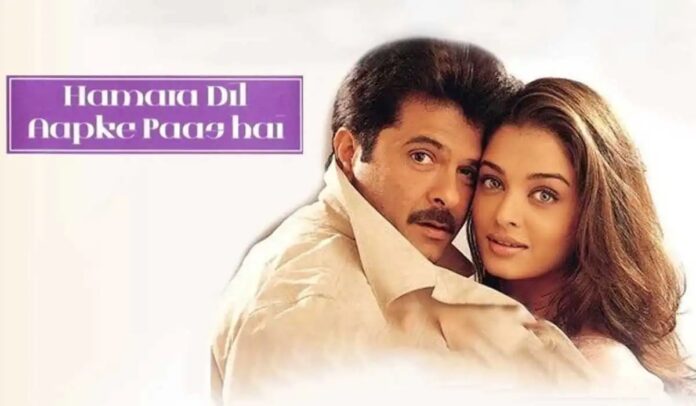HAMARA DIL AAPKE PAAS HAI
S.K. Films Enterprises’ Hamara Dil Aapke Paas Hai (UA) is the story of a principled man (hero) and a conscientious girl, who happen to meet in a crowded street where a professor is sought to be killed by a gang of villains. The girl reports the crime to the police, for which she has to pay a heavy price — she is raped by the brother of the chief of the villains; disowned by her family and friends; and she loses her job. The principled guy gives her a place in his house and she soon occupies a pride of place in his heart too. However, his proposal for marriage is turned down by her as she finds herself unfit for the position of his wife. The man’s childhood friend comes on the scene and claims his love. In the meantime, the rape victim also starts loving the guy. The complex triangle and tangle are simplified in the climax by one girl sacrificing her love. The film is inspired by the Telugu hit, Pelli Cheskundam.
There is another track too in the story — that of the hero’s step-siblings, whom his father refuses to acknowledge as being products of his lust, but who are reared by the hero.
The story is quite interesting, and the screenplay has been written to accommodate a lot of incidents and happenings which keep the audience interest alive. However, a few drawbacks in the scripting and treatment of the drama rob the film of its merited business. For one, the rape victim is shunned by her father as if she were a girl of loose character; the right reaction of the father would be to sympathise with his daughter while pleading helplessness due to his poverty. Secondly, the girl’s suffering and humiliation are shown minimally after her rape — she, in fact, leads a far more comfortable life post-rape. Thirdly, there’s no romance between the hero and the rape victim and also between the hero and his childhood friend. This makes the film more appealing for the classes than the masses. The comedy tracks would meet with mixed reactions — while some would find them hilarious, others may find them boring or even repulsive. The comedy track has no relevance to the main story. In fact, while the comedy holds more appeal for front-benchers, the story is for the gentry. Therefore, the two are mismatched. Climax is fairly good but the pre-climax sermonising is lengthy and repetitive.
On the positive side, the novelty of the subject would appeal to the ladies especially. Secondly, the drama moves at a really fast pace and does not give the audience time to think. The first half is better.
Anil Kapoor plays the man of principles, with utmost conviction and delivers a fine performance. Aishwarya Rai looks pretty at places and not so pretty at others. Although she acts well, she is stiff at times. Sonali Bendre comes as a whiff of fresh air and impresses a great deal with her free acting. Puru Raaj Kumar is very natural in a negative role. Mukesh Rishi is good. Tanaaz Currim is extremely likeable as Aishwarya’s friend. Anupam Kher’s comedy is loud and will be enjoyed by some. Himani Shivpuri is also unrestrained. Johny Lever’s comedy has some appeal even though it is not hilarious. Jaspal Bhatti and Abid are very good. Upasna Singh, Rana Jung Bahadur, Shashi Sharma, master Yash Shah, baby Kirti Bhardwaj and the artistes playing Aishwarya’s family members lend fair support. Satish Kaushik has no worthwhile role to match his brilliant acting talent. Razzak Khan is alright. Smita Jayakar is effective. Anang Desai does an average job.
Satish Kaushik’s direction is good but his handling of some dramatic scenes leaves something to be desired. For instance, while the confrontation between Aishwarya and Smita Jayakar is very fine, the reaction of Aishwarya thereafter (in front of Anil Kapoor) is incomprehensible — she almost fights with him in frustration rather than breaking down emotionally. Music (Sanjeev Darshan) is good but needed to be much better. The title song and ‘Shukriya shukriya’ number are good. ‘Gham hai kyon’ is also well-tuned and lyrically (Javed Akhtar) rich, but its dull picturisation is a major drawback, making it a walkout item! Since the romantic songs are dream sequences, the impact on the viewer is lesser. Dialogues are effective. Action is ordinary. Kabir Lal’s camerawork is not as good as his earlier works. Foreign locations, however, are extraordinary and they’ve also been captured beautifully. Production values are rich. Other technical aspects are of standard.
On the whole, Hamara Dil Aapke Paas Hai will meet with varying responses from different circuits. It should prove a good earner in Bombay, Gujarat and Maharashtra (C.P. Berar too), where it has taken a great start. In other circuits, its opening is lukewarm and, although the film will pick up by word of mouth, the jump will not be enough to shout home about. It would not be able to even cover its cost in some circuits. The appreciation will come more from the ladies and gentry audience and less from youngsters.
Released on 25-8-2000 at Novelty, New Excelsior and 22 other cinemas of Bombay thru Vimal Agarwal (Aarushi Investments) and R.M. Ahuja & Co. Publicity & opening: excellent. …….Also released all over. Opening was extraordinary in Gujarat and very good in Maharashtra but average in Delhi-U.P., East Punjab and Nizam (also affected due to heavy rains in Nizam) and poor in C.I. and Rajasthan.
LATEST POSITION
The opening of this week’s release, HAMARA DIL AAPKE PAAS HAI, is mixed. While it is fantastic in Gujarat and parts of Maharashtra, it is rather dull in C.I. and Rajasthan. …The festival period (Saatam-Aatham) in Gujarat has been responsible for all-round fantastic collections in the state.
Tera Jadoo Chal Gayaa 1st week Bombay 50,90,495 (91.37%) from 9 cinemas (11 on F.H.); Ahmedabad 19,49,599 from 4 cinemas, Baroda 100%, Padra 3,36,716, Vapi 6,21,540, Rajkot 3,53,300, Jamnagar (matinee) 39,274 (1 in regular unrecd.); Solapur 2,74,846 from 2 cinemas; Delhi 62,64,179 (65.32%) from 13 cinemas; Kanpur 3,86,986 from 2 cinemas, Lucknow 8,17,045 from 2 cinemas, Agra 5,03,000 from 2 cinemas, Allahabad 2,75,500, Bareilly 1,20,468; did ordinary in Calcutta; Nagpur 8,86,370 from 4 cinemas, Amravati 2,28,576, Raipur 1,94,618, Bhilai 3,73,034 from 2 cinemas (1 gross), Jalgaon 1,66,763, Jabalpur 1,38,502, Wardha 86,906, Chandrapur 2,44,596; Indore 3,43,545 from 2 cinemas (2 on F.H.), Bhopal 2,04,386 (1 unrecd.); Jaipur 8,74,574 (54.02%) from 3 cinemas, Bikaner 1,92,318; Hyderabad (gross) 29,64,353 from 10 cinemas (1 in noon).
……….
Dhadkan 2nd week Bombay 30,89,802 (63.41%) from 10 cinemas (7 on F.H.); Ahmedabad 16,59,966 from 6 cinemas, Baroda 3,09,314, Jamnagar 1,22,850; Solapur 1,87,465 from 2 cinemas; Delhi 26,19,007 from 8 cinemas (1 on F.H.); Kanpur 3,23,993 from 2 cinemas, Lucknow 3,43,995, Agra 3,75,000, Allahabad 1,19,500, Bareilly (6 days) 98,063; Calcutta 8,47,224 from 5 cinemas; Nagpur 3,94,174 from 3 cinemas, Akola 1,61,350, total 3,78,500, Durg 55,136 (1st 1,11,041), Rajnandgaon 70,414 (1st 1,16,433), Chandrapur 1,03,711 (1st 2,21,764); Jaipur 2,95,312 (33.87%) from 2 cinemas, Ajmer (gross) 2,11,542, Bikaner 1,09,735 (1st 2,29,378); Hyderabad (gross) 10,17,450 from 3 cinemas (1 in noon).
Deewane 2nd week Bombay 16,10,823 (54.45%) from 7 cinemas (13 on F.H.); Ahmedabad 9,99,251 from 7 cinemas, Rajkor 2,15,355, Jamnagar 1,69,757; Solapur 35,771; 1st week Hubli (6 days) 2,37,856, Dharwad (6 days) 93,897; 2nd week Delhi 12,02,117 from 9 cinemas (3 on F.H.); Kanpur 1,49,334 from 2 cinemas, Agra 1,52,000, Allahabad 1,05,034, Bareilly (6 days) 62,136; Calcutta 1,82,786; Hajipur 57,939 (1st 88,000); Nagpur 99,843 from 2 cinemas, Akola 1,10,796, total 3,00,200, Jalgaon 84,500, Wardha 36,753; Jaipur 1,66,316 from 2 cinemas.
Har Dil Jo Par Karega 3rd week Bombay 38,11,326 (75.24%) from 9 cinemas (7 on F.H.); Ahmedabad 1,55,628, Vapi 95,810; Solapur 1,44,627; Delhi 10,47,440 from 4 cinemas (1 on F.H.); Kanpur 1,82,216 from 2 cinemas, Lucknow 2,10,008, Agra 1,80,000, Allahabad 80,000, Bareilly (6 days) 38,520; Calcutta 1,92,525; Nagpur 1,67,282 from 2 cinemas, Akola 64,146, total 3,80,754, Durg (6 days) 25,169, Jalgaon 46,692, Wardha 30,825; Jaipur 1,17,070 (23.88%), Ajmer (gross) 1,18,010, Bikaner 70,000; Hyderabad (gross) 8,41,757 from 4 cinemas (1 in noon).
‘KYA KEHNA!’ SCORES A TON
Tips Films P. Ltd.’s Kya Kehna! is completing 100 days of its run today (26th August) at Plaza, Bombay in matinee shows. Directed by Kundan Shah, the film is based on a script by Honey Irani. It has dialogues by Ranjit Kapoor, and stars Preity Zinta, Saif Ali Khan, Chandrachur Singh, Farida Jalal and Anupam Kher in principal roles. The film, produced by Kumar S. Taurani and Ramesh S. Taurani, has music by Rajesh Roshan and lyrics by late Majrooh Sultanpuri.
IFDA AGM ON 10TH SEPTEMBER
The annual general meeting of the Indian Film Directors’ Association will be held on Sunday, 10th September, at 10.30 a.m. at Hotel City Point, Imperial Mahal, Khodadad Circle, Dadar T.T., Bombay.
SHAH RUKH TO PRODUCE TWO SERIALS FOR B4U
Shah Rukh Khan has tied up with B4U to produce two exclusive entertainment shows for the network. These shows will be produced by Dreamz Unlimited, a company floated jointly by Juhi Chawla, Aziz Mirza and Shah Rukh Khan.
‘BARIWALI’ INVITED TO LONDON FILM FESTIVAL
Producer Anupam Kher’s Bariwali has been invited to the 44th London Film Festival, to be held from November 1 to 16. The film has already won the NETPAC award for the most outstanding Asian film at the Berlin International Film Festival (in February this year) and the best narrative film award in the 43rd San Francisco International Film Festival. It also fetched for Kiron Kher, who plays the female lead in the film, the National Award for the best actress, and for Sudipta Chakraborty, the National Award for the best supporting actress.
‘DDLJ’ COMPLETES 250 WEEKS
Yash Chopra’s Dilwale Dulhania Le Jayenge, with which Aditya Chopra made his debut as director, entered combined 250th week in matinee shows at Maratha Mandir, Bombay. The film is still going strong and has broken the longest run record of all first-run films except that of Sholay which had completed 265 weeks at Minerva, Bombay in regular and matinee shows combined.
MUKTA ARTS’ PRE-LISTING PRESENTATION TO BSE MEMBERS
Subhash Ghai, chairman and managing director of Mukta Arts, made a presentation to the members of the Bombay Stock Exchange at the pre-listing ceremony held at the Convention Centre of the BSE on 25th August. It was a rare honour accorded by the BSE to the company. Mukta Arts was only the second company to be invited for such an address.
The presentation by Ghai was attended by the movers and shakers of the Bombay broking community. Prominent members of the BSE governing board including Anand Rathi (president), Deena Mehta (vice president), A.N. Joshi (executive) and J.J. Bhatt (director, investor services & listing) graced the occasion.
The total revenue generation of the film industry is expected to grow from Rs. 6,215 crore in 1999 to Rs. 33,984 crore by 2005, and export earnings from film software are expected to increase from Rs. 665 crore to Rs. 14,700 crore by 2005. In this positive scenario, Mukta Arts has planned a leadership position. Outlining the company’s current projects and its future plan, Subhash Ghai invited BSE members and the general public to benefit from the entertainment boom by participating in it.
Mukta Arts, it may be added here, made a successful Initial Public Offering (IPO) of Rs. 100 crore in July this year. Its book-built portion was built 5.80 times in the institutional category and 3.51 times in the non-institutional category. This was at a price of Rs. 170 per share. In spite of such a good demand, the issue price was fixed at an investor-friendly Rs. 165 per share. The retail portion received an encouraging response from the market.
Mukta Arts proposes to set up an integrated studio complex-cum-research and training centre in order to be in line with the technological advancements in the world in the area of film production and to create a pool of new talent in filmmaking. The company is also expanding its existing studio facilities of Audeus from the present 13,000 sq. ft. to 26,000 sq. ft. and adding a music recording studio, a mixing theatre and editing suites. Mukta Arts also intends to acquire rights (viz. theatrical, television, satellite, cable, overseas, music, CD, DVD, internet etc.) of quality movies of other production houses and consolidate its library. It will also venture into production of television serials and production and marketing of music albums. It is setting up a portal for web broadcasting, covering various aspects of the film industry. The company is also in the process of setting up its own distribution centres and overseas offices in the US, the UK and the Middle East in order to optimise its overseas earnings.
PRANLAL MEHTA DEPARTS
Well-known producer and distributor Pranal Mehta breathed his last on the morning of 20th August at Lilavati Hospital, Bandra, Bombay, following a heart attack. It was the second attack that claimed his life. He had suffered the first attack just a little before the second one. Pranlal Mehta had been under great mental stress and was not keeping good health since a month. He was first admitted to the Arogya Nidhi Hospital, Juhu, Bombay and later shifted to Lilavati Hospital. He was shited to the hospital’s ICU last week.
Pranlal Mehta started as a distributor of Mysore with his father, Veljibhai’s concern in Bangalore. He shifted to Bombay in 1976 and entered film production with Gulzar as his partner. They (Pranlal Mehta and Gulzar) made Kitaab and Kinara. Both the films did not fare well at the box-office. Yet, Pranlal Mehta pursued film production with grit and determination. He set up his own banner, Prathima Films, named after his wife, Prathima. The first film under this banner was Hum Se Badhkar Kaun which was a success.
In the last 23 years, he had produced 24 films, including some successful films like Bezubaan (directed by Bapu), Marte Dam Tak (Mehul Kumar), 100 Days (with which director Parto Ghosh made a foray into the big league), Love 86, Police Public and Suryaa (all directed by Esmayeel Shroff), a Gujarati film, Garvi Naar Gujaratni, and a Kannada film. Among the other films he had produced were Dharm Aur Qanoon, Main Balwaan, Saatwan Aasmaan, Jawani Zindabad, Woh Phir Aayegi, Muskurahat, Zid, Mafia, Jiyo Shaan Se, Betaaj Badshah, Jungbaaz, Yugpurush and Tarkieb. His Chalo Ishq Ladaaye, starring Govindia, is nearly complete.
Pranlal Mehta endeared himself to his friends for his affable nature. He suffered financial setbacks in the early nineties. His Chalo Ishq Ladaaye has been long in the making.
Pranlal Mehta is the only producer to have made five films with Raaj Kumar — Marte Dam Tak, Jungbaaz, Suryaa, Police Public and Betaaj Badshah.
He was 62 and is survived by his wife and two sons, Vijay and Jay, who are also producers. Jay Mehta had been introduced as a hero in Muskurahat and also played the lead man in Zid.
A prayer meeting to condole his demise was held on 21st August at Arya Vidya Mandir at JVPD Scheme, Bombay.
SUJIT KUMAR HONOURED BY UTTAR PRADESH GOVT.
Actor-producer Sujit Kumar was honoured by the government of Uttar Pradesh on 14th August for his contribution to Bhojpuri films, Bhojpuri language and culture. He was felicitated along with other prominent personalities from various walks of life.
Sujit Kumar started his career as an actor and later produced and directed Bhojpuri films. As a lead man, his first Bhojpuri film, Bidesiya, released in the early ’60s, had proved a super-hit. His last Bhojpuri film was Paan Khaye Saiyyan Hamaar, which had also proved a big hit. He acted in 25 Hindi films as lead man before he switched over to playing character roles beginning with Aradhana. The Hindi films he has produced are Anubhav, Aasman Se Ooncha, Khel and Daraar. He is currently producing Champion, starring Sunny Deol and Manisha Koirala.
MAMTA KULKARNI ACQUITTED
Additional chief metropolitan magistrate (Bombay) K.H. Holambe-Patil on 25th August acquitted Mamta Kulkarni in the obscenity case filed against her for posing semi-nude in a glossy.
While passing the judgement, Mr. Holambe-Patil said, as the facts in the case against Mamta Kulkarni in the Andheri (Bombay) court and the present one were the same and as she had already pleaded guilty and been convicted by the Andheri court, Bombay, the present prosecution as far as Mamta Kulkarni was concerned was barred.
A case was registered by the city police in 1995 against the actress, the then editor of Stardust and photographer Jayesh Seth for publishing obscene pictures of Mamta in the September 1993 issue of Stardust. Proceedings will continue against the said editor and the photographer.
Advocate Peter Lobo, who appeared for the actress, had filed for a dismissal of the complaint under section 300 of the Criminal Procedure Code. According to this section, no person can be tried for the same offence twice.
YOU ASKED IT
With big films tumbling one after the other at the box-office in recent months, what corrective measures need to be adopted by the filmmakers?
– Just one, dear. Let the filmmakers devote time to writing scripts, and everything else will automatically fall in place. Our filmmakers are not being honest with the scripts and, therefore, the high casualty rate.
Which old comedy film can be remade successfully in keeping with today’s times?
– CHALTI KA NAAM GAADI, PADOSAN, PYAR KIYE JAA, to name some. They will have to be adapted to today’s times.
Where is one’s investment the safest — in building a cinema hall or investing in production or in distribution?
– It’s not so simple to guess where one’s investment will be the safest. But investing in a tasteful cinema hall can be profitable today.
CENSOR NEWS
The Culture Co. (India) P. Ltd.’s Fiza (social) was given C.C. No. CIL/2/28/2000 (UA) dt. 24-8-2000; length 4665.38 metres in 17 reels (cuts: 16.69 metres).
Bhushan Film Production’s Khooni Saaya (horror) was given C.C. No. CIL/3/80/2000 (A) dt. 16-8-2000; length 3033.98 metres in 16 reels (cuts: 58.71 metres).
R.D. Films’ Rani Mera Naam (revised; social) was given C.C. No. CIL/3/82/2000 (A) dt. 18-8-2000; length 3089.11 metres in 16 reels (cuts: 32.93 metres).
5001 Films’ Daku Ganga Jamuna (social) was given C.C. No. CIL/2/27/2000 (UA) dt. 23-8-2000; length 2548.72 metres in 14 reels (cuts: 2.36 metres).
Paramount Films’ Gladiator (Vijeta) (dubbed; historical) was given C.C. No. CFL/2/22/2000 (UA) dt. 22-8-2000; length 4251.96 metres in 16 reels (no cut).
SPE Films’ Jaanbaaz Jodi (dubbed; action), seen on 18th, has been issued C.C. No. CFL/2/23/2000 (UA) dt. 22-8-2000; length 3044 metres in 6 reels (no cut).
Promise Pictures 1997’s The Revenge Of Geeta Mera Naam has been passed for adults, with cuts.
R.N. Films’ Geeta Mera Naam (revised) has been passed for adults, with cuts.
NFDC Ltd.’s Kuchh Dil Ne Kaha (length 4091.07 metres in 15 reels), applied on 21st, was seen on 22nd.
Ajitabh Corporation’s Lal Haveli (3rd revised version; length 2271.32 metres) in 12 reels, applied on 23rd, was seen on 24th.
PRODUCTION NEWS
‘Aap Mujhe Achche Lagne Lage’ 14-Day Stint
Mohan Kumar and Emkay Films Pvt. Ltd.’s Aap Mujhe Achche Lagne Lage is currently being shot in a 14-day spell on a set of a bungalow at Filmalaya Studios. Hrithik Roshan, Amisha Patel, Kiran Kumar, Mukesh Tiwari, Nishigandha Wad, Sheikh Shamim, Moses Lever, Robin Bhatt and junior artistes are participating. The film is being produced by Rohit Kumar and directed by Vikram Bhatt. Story & screenplay: Robin Bhatt and Sanjeev Duggal. Dialogues: Girish Dhamija. Cinematographer: Pravin Bhatt. Lyrics: Ibrahim Ashq. Music: Rajesh Roshan. Dances: Raju Khan. Art: Gappa Chakraborty. Sound: Murari Krishna. Editor: Amit Saxena. The film is presented by Gautam Kumar.
Raj Kumar Kohli’s Film Launched With Recording
Shankar Movies’ Prod. No. 5 was launched with the recording of a song on Aug. 21 at Sunny Super Sounds. Penned by Sameer, the song was set to tune by Anand Milind and rendered by Sonu Nigam, Jaspinder Narula and chorus. The film is being produced and directed by Raj Kumar Kohli. It stars Sunny Deol, Akshay Kumar, Sunil Shetty, Manisha Koirala, Rambha, Aftab Shivdasani, Aditya Pancholi, Mohini Sharma, Arshad Warsi, Rajat Bedi and Monish Kohli. Nishi presents it
Rama Naidu Announces Two Films
Producer Dr. D. Rama Naidu has announced two films to be made under the banner of Suresh Productions. Venkatesh and Karisma Kapoor will play the lead roles in one of the films, which will go on the floors in October. The second will be a remake of the Telugu film, Kalasivundham Raa, made by the same producer. The film will be directed by K. Ravi Shankar. It has dialogues by Jainendra Jain. It will go on the floors in December.
IN & OUT OF BOMBAY
Producer Vashu Bhagnani and Abhishek Bachchan went on a whirlwind tour of Agra, Kanpur and Lucknow on 25th August, making appearances in cinemas screening TERA JADOO CHAL GAYAA.
Producer Boney Kapoor is in Delhi.
Producer-director Subhash Ghai returned from Delhi on 25th and is due to fly to London in a couple of days.
“Hum Chhod Chale Hain Mehfil Ko, Yaad Aaye Kabhi To Mat Rona”
KALYANJI BIDS ADIEU
GAJAA
Kalyanji Virji Sha of the popular Kalyanji-Anandji music duo breathed his last on 24th August at Breach Candy Hospital, Bombay at 5 p.m. following lung failure. The music director, who was a chronic asthma patient, was admitted to the hospital a fortnight back. Incidentally, a day before his demise, the evergreen Kalyanji-Anandji tune, Govinda aala re, from Bluff Master, dominated the air waves throughout the day as 23rd August happened to be the Gokul Ashtami day. Kalyanji was 73 and is survived by his wife and five sons including music director Viju Sha. He was cremated the same evening at Chandanwadi.
Kalyanjibhai, as he was referred to affectionately by everybody in the industry, was known for his good humour, good nature and good tunes which were mostly based on folk or classical music. Kalyanji-Anandji created their own kind of music which comprised uncomplicated tunes garnished with unobtrusive orchestration. Kalyanji had once said, “Simpler the tunes, more popular the songs. But it is difficult to make a simple tune.”
Born in a Kutchi business family, Kalyanji ‘strayed’ into the world of film music on his own. He began his career as a musician in 1952. The been music, innovated by Kalyanji on his clavioline for the famous song of Nagin, Man dole mera tan dole re, which was tuned by Hemant Kumar, brought Kalyanji into the limelight.
He began his career as a solo music director with Babubhai Mistry’s Samrat Chandragupta, released in 1958. In the same year came Post Box 999. The songs of both the films were a rage. These films were followed by Delhi Junction, Tera Kya Kehna and Chandrasena. Kalyanji formed a team with his brother, Anandji, in 1958 and their debut film once again was a Babuhai Mistry-directed film, Bedard Zamana Kya Jaane (1959), produced by Subhash Desai who repeated them in his next, Chhalia, which was the debut-making film of director Manmohan Desai. Kalyanji Anandji stood their own musical ground in their initial days despite competition of quality music from formidable veterans of the day like Shanker Jaikishen, Naushad, O.P. Nayyar, Roshan, Madan Mohan, N. Dutta, Chitragupt, Ravi, Salil Choudhry and Hemant Kumar.
Kalyanji-Anandji then hit big time with Himalay Ki Godmein and Johar Mehmood In Goa (1965), and Upkar (1967). In 1968, the duo won the National Award for its mellifluous score in Saraswatichandra. 1970 saw Kalyanji Anandji at the peak with Geet, Gopi, Johny Mera Naam, Ghar Ghar Ki Kahani, Vishwas, Holi Aayee Re, Kab? Kyon? Kahan?, Sachaa Jhutha, Purab Aur Pachhim, Priya, Safar and Yaadgaar. Twelve films — with all hit songs of that year, when they had stiff competition from Laxmikant-Pyarelal who were their musicians and assistants for six years, from 1959 to 1965 (from Homi Wadia’s Chandrasena to Vijay Bhatt’s Himalay Ki Godmein)!
The duo remained very active for two decades till the fag end of the ’70s. Thereafter, Kalyanji Anandji scored music only for films made by a few maker-friends like Arjun Hingorani, Prakash Mehra and Rajiv Rai. Their last film was B.R. Chopra’s Pratigyabadh (1991).
Kalyanji Anandji were conferred the Padma Shri in 1994, the Lata Mangeshkar award in 1996, and also the Sur Singar Samsad award in 1985. Besides the National Award for Saraswatichandra, they were presented the Filmfare award for Kora Kagaz.
The duo scored music for over 250 films which included three Gujarati films, Mehndi Rang Lagyo, Kasumbi No Rang and Akhand Saubhagyavati. All these Gujarati films had evergreen melodies which have become part of the Gujarati folklore. Among their 250-plus films, 40 had celebrated silver jubilees and 12 were golden jubilee hits. They were the first music directors to win the platinum discs — for their work in Muqaddar Ka Sikandar and Qurbani.
Kalyanji-Anandji were content with their musical contributions. They never displayed aggressiveness for adding to their assignments. Unlike the present-day music directors, they did not believe in going to a producer’s or director’s house and performing an ‘orchestra’ of their tunes! They preferred working in their own music room. In the eighties, with a majority of filmmakers having shifted to the suburbs, they found it too inconvenient to have music sittings at Kalyanji-Anandji’s music room at Peddar Road, which is in the hub of Bombay city. But that did not unnerve the duo. As Kalyanjibhai once joked, “We may not give songs, but we will give singers.” Kalyanjibhai imparted training to many budding singers. Among those who have been groomed by Kalyanji-Anandji are Sadhana Sargam, Sonali Bajpai, Manhar Udhas, Alka Yagnik, Sapna Mukerji, Hemlata and Aditya Narayan (son of Udit Narayan), besides many musicians who are all busy.
Kalyanji then launched a troupe — ‘Little Wonders’ — in 1993 to showcase the singing and music talents of prodigious kids aged between three and twelve. More than 200 shows of ‘Little Wonders’ have been performed so far. Sunidhi Chauhan, who came into limelight with Ruki ruki si zindagi (Mast) song, is a product of ‘Little Wonders’.
Kalyanji loved cracking jokes which had relevance to the topic of the day. He used to create humorous anecdotes himself, just to make people laugh. His wife, Sakarben, or he himself used to be the butt end of many of his jokes.
Kalyanji-Anandji always believed in holding musical shows for charitable causes, whether for their community or for the nation. In 1978, there was a severe drought in the Kutch district (Gujarat). Kalyanji-Anandji raised funds through a series of their stage shows and rehabilitated the inhabitants of the drought-stricken village. The people of the village, as a token of thanksgiving gesture, offered to rename the place as Kalyanji-Anandji Nagar. But the duo requested the villagers to retain the old name of the village as helping the villagers, they said, was “a part of the duty towards a humanitarian cause”.
Kalyanji’s contribution to film music (alongwith Anandji) will remain immortal in the minds of music lovers. Here are some of the gems of the genius duo: Chandan sa badan and Main toh bhool chali babul ka desh (Saraswatichandra), Tumhein yaad hoga kabhi hum mile thhe (Post Box 999), Chahe paas ho chahe door ho (Samrat Chandragupta), Mere toote huwe dil se (Chhalia), Kankariya maar ke jagaaya and Chand si mehbooba ho meri kab (Himalay Ki Godmein), Govinda aala re (Bluff Master), Kasme vaade pyar wafa and Mere desh ki dharti (Upkar), Waqt karta jo wafa (Dil Ne Pukara), Jis path pe chala and Ek tara bole (Yaadgaar), Ye do deewane dil ke (Johar Mehmood In Goa), Aaja tujhko pukare mere geet (Geet), Sukh ke sab saathi and He Ramchandra kahe gaye (Gopi), O babul pyare (Johny Mera Naam), Sama hai suhana (Ghar Ghar Ki Kahani), Dil ko dekho chehra na dekho (Sachaa Jhutha), Koi jab tumhara hriday tod de (Purab Aur Pachhim), Jo tumko ho pasand wohi baat karenge, Hum thhe jinke sahare and Zindagi ka safar (Safar), Do bechare bina sahare (Victoria No. 203), Khaike paan Banaraswala (Don), Peenewalon ko peene ka bahana chahiye (Haath Ki Safai), Ek batta do (Kalicharan), Pal pal dil ke paas (Blackmail), Samjhauta ghamon se kar lo (Samjhauta), Yaari hai imaan mera yaar meri zindagi (Zanjeer), Zubaan pe dard bhari daastan chali aayi (Maryada), Mera jeevan kora kagaz and Mera padhne mein nahin laage dil (Kora Kagaz), Humka aisa waisa na samjho (Adalat), Tumko mere dil ne (Rafoo Chakkar), Rote huwe aate hain sab (Muqaddar Ka Sikandar), Mere angne mein (Laawaris), Laila main Laila (Qurbani), Kya khoob lagti (Dharmatma)… the list can go on and on.
Kalyanji Anandji were the first music directors to perform shows abroad, with Amitabh Bachchan as the star attraction, and thereby setting off a trend of staging star-shows in foreign countries.
Pyarelal (of Laxmikant Pyarelal) paid homage to Kalyanjibhai thus: “We have been family friends. Whenever we used to have any music function or ceremony at our house, Kalyanjibhai and Sakar bhabhi‘s presence was a must. We shared a lot of affection for each other’s families. Kalyanjibhai was a self-made man. No one fully knows the sterling contributions these brothers have made to film music and to the society in general. They groomed the maximum number of leading playback singers of today. When we were their assistants, they used to insist upon the producers to give our names as ‘chief assistant music directors’ along with their names on the same card, in the film titles. May there be more people like Kalyanji and Anandji.”
Anandji was emotionally choked while expressing his sorrow, but managed to say, “I feel as if a roof has been blown off from our house. He was a father-figure to all of us in the family. I am feeling incomplete…” Anandji could not complete his sentence as he broke down mid-way.
Viju Sha, Kalyanji’s music director-son, was also overcome with grief as he said, “What can I say? He played a great innings. I was fortunate to have my father as my guru.”
While Kalyanji was being taken on his final journey, the hasta-hua-jo-jayega muqaddar-ka-Sikandar seemed like bidding adieu to his fans, with a faint smile which seemed to convey,
“Hum chhood chale hain mehfil ko,
Yaad aaye kabhi to mat rona”.
VEERAPPAN STICKS TO HIS GUNS:
IMPASSE OVER RAJKUMAR’S RELEASE
Uncertainty still looms large over the release of Kannada superstar Dr. Rajkumar who is being held hostage since July 30 by forest brigand Veerappan. All hopes of Rajkumar’s release “in a day or two” have thus been quashed once again. There is general despondency among the star’s fans. The disappointment is more palpable among cine workers in Karnataka who have been affected the most due to the Karnataka film industry’s ‘solidarity strike’. The Karnataka Film Chamber of Commerce (KFCC), in a compensatory gesture, has disbursed Rs. 1,000 to the most needy among the cine employees.
Some shootings, in the meantime, resumed on 23rd August on outdoor locations in Karnataka but not in the studios.
Veerappan has reportedly conveyed through Tamil Nadu CM Karunanidhi’s emissary, newspaper editor R.R. Gopal, that he (Veerappan) was in no mood to relent until all his demands were conceded to by the chief ministers of Tamil Nadu and Karnataka.
Veerappan has now also made fresh demands. Meanwhile, R.R. Gopal will be leaving on his third mission to Veerappan’s hideout on August 28. The bandit has set August 29 as the deadline for getting a response from the Tamil Nadu and Karnataka chief ministers.
SALE OF SATELLITE RIGHTS OF FILMS
FDC Refuses To Toe The CCCA Line
A meeting between representatives of the Film Makers Combine (FMC) and those of the Film Distributors Council (FDC) was held in the office of the Motion Picture Association (MPA) in New Delhi on 21st August to discuss the implication of the sale of satellite, video and cable TV rights by producers.
It may be recalled here that a meeting was held on 19th June in Bombay between the distributor-members of the CCCA (an affiliate of the FDC) and the producers (FMC). The meeting was chaired by CCCA president Santosh Singh Jain. At the meeting, it was agreed between the producers and the CCCA distributor-members of C.P., C.I. and Rajasthan that the producers can sell satellite rights within one year of the film’s theatrical release. This was a major shift from the earlier joint policy of the FDC and the FMC, under which producers were restrained from selling satellite rights for 5 years from the date of premiere theatrical release.
At the meeting held on 21st August in Delhi, the FDC made it clear that it would not toe the line of the CCCA as the all-India distributors were not taken into confidence before the CCCA signed the agreement with the FMC in Bombay in June. Tension prevailed throughout the deliberations and no consensus could be arrived at. Another meeting to discuss the same issue will now be held on 20th October.
In order not to ruffle more feathers, the FMC suggested that the members of the AIFPC also be invited (along with the FMC) to thrash out the issue in a cordial manner. The FMC also suggested that the IMPDA office-bearers be invited to participate in the proceedings to arrive at “an appropriate, mutually beneficial decision on this subject”.
The FDC was represented by Munnabhai, president of the EIMPA, Calcutta; Santosh Singh Jain, president of the CCCA, Bhusawal; Prabhat Bhushan, president of the BMPA, Patna; G.D. Mehta, president, and G.S. Mayawala, hon. general secretary of the MPA, Delhi; and Dharam Paul, president, and Yash Paul Mittal, hon. general secretary of the NIMPA, Jalandhar. The FMC was represented by its chairman, Shakti Samanta, hon. general secretary, Surjit Aujla, K.D. Shorey and vice presidents of the WIFPA, Sangram Shirke and Naresh Mohnot.
3-E
Education-Entertainment-Enlightenment
Fear Over ‘Fiza’
A statement by Hrithik Roshan in an interview of the hero, carried by a national daily recently, has had distributors of his forthcoming starrer, Fiza, panicking. In panic are also exhibitors who’ve paid hefty MGs and FHs for Fiza. Those exhibitors, who were on the verge of finalising the film on fancy terms, have stopped to reconsider their decisions. The statement which set off a trail of fear in the minds of the trade people was Hrithik’s declaration that he appears in Fiza only after the interval. The hype surrounding Fiza is, obviously, due to Hrithik and, of course, the hit music too. But with Hrithik hinting that Fiza is more Karisma Kapoor’s film (Fiza is her name in the film) than his, distributors and exhibitors of the film are now getting nervous. The nervousness will remain till September 8 when Fiza hits the screens.
Braveheart Bhagnani
One can’t help but admire the guts of producer Vashu Bhagnani. Like Biwi No. 1, he released his Tera Jadoo Chal Gayaa, too, himself in most of the circuits. East Punjab, Bihar and Nizam are the only three circuits which are not in his account in the case of Tera Jadoo Chal Gayaa. And although the magic hasn’t really worked, is Bhagnani unhappy? Not really, because, as Vashu puts it, “I’ve recovered my entire cost from only the sale of satellite, music and Overseas rights of the film.”
Hello, Brother Hrithik!
While the publicity blurbs of Fiza describe the film’s subject as “in search of her brother” (brother played by Hrithik Roshan), Raksha Bandhan this year saw girls of all age-groups in search of the brother in Fiza — that is, hero Hrishik Roshan! The proof of this was the record number of raakhis Hrithik received from his self-proclaimed sisters from various parts of the country. They totalled more than 3,500! Would he have received these many tokens of sisterly love had Hrithik not announced his marriage next year, to his girlfriend, Suzanne?
The Right And The Wrong
While some in the distribution trade would swear by good cinemas for their films, there are others who couldn’t care less for the quality of cinemas. Shares are what matter to them. One such distributor is P.P. Associates of Delhi-U.P. The concern was recently criticised for booking a poor chain of cinemas for its Bichhoo in Delhi. But Paul and Puri are quick to retaliate, “What is the sense of running after good cinemas when even they cannot guarantee a decent opening of a film? It is better to get good MGs and FHs even if it means screening your film in lesser cinemas because that way, you are at least safeguarding your interest as well as the interest of your producer. People, who are critical of our choice of cinemas in Delhi for Bichhoo, do not, perhaps, know that the share of Bichhoo from Delhi is barely 5 lakh less than the share of a hit film like Soldier from Delhi. This would never have been possible had we gone in for a chain of the so-called good cinemas. We can confidently say that we will give overflow to Guddu Dhanoa for Bichhoo. Now, will anybody fault us for ‘wrong’ selection of cinemas?” Point noted!
A 100 Marks To Mahesh Bhatt!
Though director Mahesh Bhatt seems to be content after having bid ‘bye to direction, he is very much concerned about the content — that is, content in today’s films. Commenting on today’s dazzling publicities and forceful marketing strategies of so many big star-cast films, several of which sadly have no worthwhile stories, he made a comment that should make filmmakers sit up and think. Likening publicity to handwriting, he said, “Merely good handwriting never guaranteed any student 100% marks!” A hundred marks to you, Mahesh. This thought has content in good measure!






























